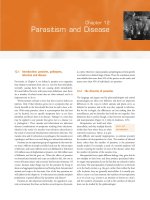Lecture Accounting principles (8th edition) – Chapter 12: Accounting for partnerships
Bạn đang xem bản rút gọn của tài liệu. Xem và tải ngay bản đầy đủ của tài liệu tại đây (862.16 KB, 53 trang )
Chapter
12-1
CHAPTER 12
ACCOUNTING FOR
PARTNERSHIPS
Accounting Principles, Eighth Edition
Chapter
12-2
Study Objectives
Study Objectives
1.
Identify the characteristics of the partnership form of business
organization.
2.
Explain the accounting entries for the formation of a partnership.
3.
Identify the bases for dividing net income or net loss.
4.
Describe the form and content of partnership financial statements.
5.
Explain the effects of the entries to record the liquidation of a
partnership.
Chapter
12-3
Accounting for Partnerships
Accounting for Partnerships
Partnership
Partnership
Form
Formof
of
Organization
Organization
Characteristics
Organizations
with partnership
characteristics
Advantages /
disadvantages
Partnership
agreement
Chapter
12-4
Basic
Basic
Partnership
Partnership
Accounting
Accounting
Forming a
partnership
Dividing net
income / loss
Financial
statements
Liquidation
Liquidationof
ofaa
Partnership
Partnership
No capital
deficiency
Capital
deficiency
Partnership Form of Organization
Partnership Form of Organization
A partnership is an association of two or more persons to carry
on as coowners of a business for profit.
Type of Business:
Small retail, service, or manufacturing companies.
Accountants, lawyers, and doctors.
Chapter
12-5
LO 1 Identify the characteristics of the partnership form of
business organization.
Partnership Form of Organization
Partnership Form of Organization
Discussion Question
Q121 The characteristics of a partnership include the
following: (a) association of individuals, (b) limited life, and (c)
coownership of property. Explain each of these terms.
See notes page for discussion
Chapter
12-6
LO 1 Identify the characteristics of the partnership form of
business organization.
Characteristics of Partnerships
Characteristics of Partnerships
Association of Individuals
Legal entity.
Accounting entity.
Net income not taxed as a separate entity.
Mutual Agency
Act of any partner is binding on all other partners, so long as the
act appears to be appropriate for the partnership.
Chapter
12-7
LO 1 Identify the characteristics of the partnership form of
business organization.
Characteristics of Partnerships
Characteristics of Partnerships
Limited Life
Dissolution occurs whenever a partner withdraws or a new partner
is admitted.
Dissolution does not mean the business ends.
Unlimited Liability
Each partner is personally and individually liable for all
partnership liabilities.
Chapter
12-8
LO 1 Identify the characteristics of the partnership form of
business organization.
Characteristics of Partnerships
Characteristics of Partnerships
Coownership of Property
Each partner has a claim on total assets.
This claim does not attach to specific assets.
All net income or net loss is shared equally by the partners, unless
otherwise stated in the partnership agreement.
Chapter
12-9
LO 1 Identify the characteristics of the partnership form of
business organization.
Characteristics of Partnerships
Characteristics of Partnerships
Question
All of the following are characteristics of partnerships except:
a. coownership of property.
b. mutual agency.
c.
limited life.
d. limited liability.
Chapter
12-10
LO 1 Identify the characteristics of the partnership form of
business organization.
Organizations with Partnership Characteristics
Organizations with Partnership Characteristics
Special forms of business organizations are often used to provide
protection from unlimited liability.
Special partnership forms are:
1. Limited Partnerships,
2. Limited Liability Partnerships, and
3. Limited Liability Companies.
Chapter
12-11
LO 1 Identify the characteristics of the partnership form of
business organization.
Organizations with Partnership
Organizations with Partnership
Characteristics
Characteristics
Regular Partnership
Major Advantages
Major Disadvantages
Simple and inexpensive to
create and operate.
Chapter
12-12
Owners (partners) personally
liable for business debts.
LO 1 Identify the characteristics of the partnership form of
business organization.
Organizations with Partnership
Organizations with Partnership
Characteristics
Characteristics
“Ltd.,” or “LP”
Major Advantages
Limited partners have limited
personal liability for business
debts as long as they do not
participate in management.
General partners can raise cash
without involving outside
investors in management of
business.
Chapter
12-13
Major Disadvantages
General partners personally liable
for business debts.
More expensive to create than
regular partnership.
Suitable for companies that invest
in real estate.
LO 1 Identify the characteristics of the partnership form of
business organization.
Organizations with Partnership
Organizations with Partnership
Characteristics
Characteristics
“LLP”
Major Advantages
Mostly of interest to partners in
oldline professions such as law,
medicine, and accounting.
Owners (partners) are not
personally liable for the
malpractice of other partners.
Major Disadvantages
Unlike a limited liability
company, partners remain
personally liable for many types of
obligations owed to business
creditors, lenders, and landlords.
Often limited to a short list of
professions.
Chapter
12-14
LO 1 Identify the characteristics of the partnership form of
business organization.
Organizations with Partnership
Organizations with Partnership
Characteristics
Characteristics
“LLC”
Major Advantages
Owners have limited personal
liability for business debts even if
they participate in management.
Chapter
12-15
Major Disadvantages
More expensive to create than
regular partnership.
LO 1 Identify the characteristics of the partnership form of
business organization.
Partnership Characteristics
Partnership Characteristics
Discussion Question
Q123 Brent Houghton and Dick Kreibach are considering a
business venture. They ask you to explain the advantages and
disadvantages of the partnership form of organization.
See notes page for discussion
Chapter
12-16
LO 1 Identify the characteristics of the partnership form of
business organization.
Partnership Characteristics
Partnership Characteristics
Question
Under which of the following business organization forms do limited
partners have little, if any, active role in the management of the
business?
Chapter
12-17
a.
Limited liability partnership.
b.
Limited partnership.
c.
Limited liability companies.
d.
None of the above.
LO 1 Identify the characteristics of the partnership form of
business organization.
Partnership Agreement
Partnership Agreement
Should specify relationships among the partners:
1. Names and capital contributions of partners.
2. Rights and duties of partners.
3. Basis for sharing net income or net loss.
4. Provision for withdrawals of assets.
5. Procedures for submitting disputes to arbitration.
6. Procedures for the withdrawal or addition of a partner.
7. Rights and duties of surviving partners in the event of a partner’s death.
Chapter
12-18
LO 1 Identify the characteristics of the partnership form of
business organization.
Forming a Partnership
Forming a Partnership
Question
When a partner invests noncash assets in a partnership, the assets
should be recorded at their:
a. book value.
b. carrying value.
c. fair market value.
d. original cost.
Chapter
12-19
LO 2 Explain the accounting entries for the formation of a partnership.
Forming a Partnership
Forming a Partnership
Partner’s initial investment should be recorded at the fair market value
of the assets at the date of their transfer to the partnership.
E122 Meissner, Cohen, and Hughes are forming a partnership. Meissner is
transferring $50,000 of cash to the partnership. Cohen is transferring land worth
$15,000 and a small building worth $80,000. Hughes transfers cash of $9,000,
accounts receivable of $32,000 and equipment worth $19,000. The partnership
expects to collect $29,000 of the accounts receivable.
Instructions: Prepare the journal entries to record each of the partners’
investments.
Chapter
12-20
LO 2 Explain the accounting entries for the formation of a partnership.
Forming a Partnership
Forming a Partnership
E122 Meissner is transferring $50,000 of cash to the partnership.
E122
Prepare the entry.
Cash
50,000
Meissner, Capital
50,000
Cohen is transferring land worth $15,000 and a small building worth
$80,000. Prepare the entry.
Chapter
12-21
Land
15,000
Building
Cohen, Capital
80,000
95,000
LO 2 Explain the accounting entries for the formation of a partnership.
Forming a Partnership
Forming a Partnership
E122 Hughes transfers cash of $9,000, accounts receivable of $32,000
E122
and equipment worth $19,000. The partnership expects to collect $29,000
of the accounts receivable. Prepare the entry.
Cash
9,000
Accounts receivable
Equipment
Allowance for doubtful accounts
Hughes, Capital
Chapter
12-22
32,000
19,000
3,000
57,000
LO 2 Explain the accounting entries for the formation of a partnership.
Dividing Net Income or Net Loss
Dividing Net Income or Net Loss
Partners equally share net income or net loss unless the partnership
contract indicates otherwise.
Closing Entries:
Close all Revenue and Expense accounts to Income Summary.
Close Income Summary to each partner’s Capital account for his or her
share of net income or loss.
Close each partners Drawing account to his or her respective Capital
account.
Chapter
12-23
LO 3 Identify the bases for dividing net income or net loss.
Dividing Net Income or Net Loss
Dividing Net Income or Net Loss
Income Ratios
Partnership agreement should specify the basis for sharing net income or net
loss. Typical income ratios:
Fixed ratio.
Ratio based on capital balances.
Salaries to partners and remainder on a fixed ratio.
Interest on partners’ capital balances and the remainder on a fixed
ratio.
Salaries to partners, interest on partners’ capital, and the remainder
on a fixed ratio.
Chapter
12-24
LO 3 Identify the bases for dividing net income or net loss.
Dividing Net Income or Net Loss
Dividing Net Income or Net Loss
Discussion Question
Q127 Blue and Grey are discussing how income and losses
should be divided in a partnership they plan to form. What
factors should be considered in determining the division of net
income or net loss?
See notes page for discussion
Chapter
12-25
LO 3 Identify the bases for dividing net income or net loss.









